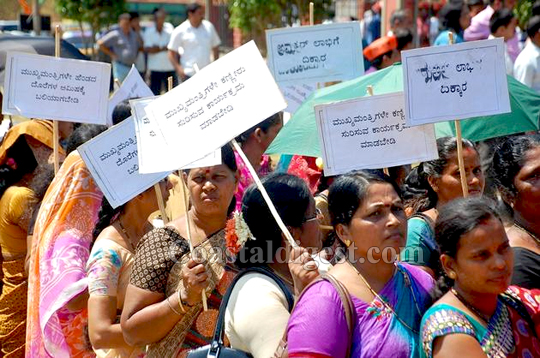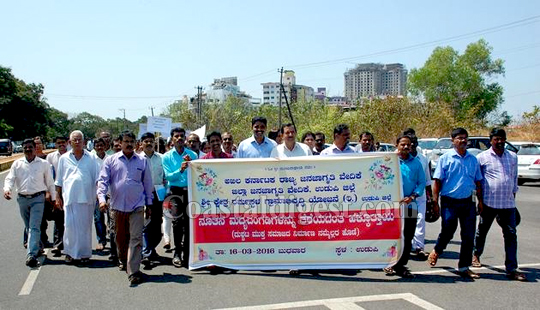Udupi, Mar 17: A large number of women took out a rally from Peramapalli Circle to the Deputy Commissioner's Office in Udupi, urging the Karnataka government not to permit any more liquor shops in the State.

The rally was jointly organised by the district units of Zilla Janajagriti Vedike and Sri Kshetra Dharmasthala Rural Development Project (SKDRDP).
The protesters held placards with messages including “Chief Minister, Do not fall into the trap of liquor barons,” “Do not permit new liquor shops,” “Do not bow to the liquor lobby,” “Chief Minister, Do not make people to shed their tears” and “Down with liquor lobby.”
Devadas Hebbar, leader of the district unit of the Vedike, said that there were reports that the State government was planning to allow the opening of 1,500 liquor shops in the State for resource mobilisation in its forthcoming budget for 2016-17. Recently, the government had permitted the opening of 9,600 liquor shops. Of these 9,600 establishments, 3,950 were wine shops.
The government would do well to study the social impact of its decision. This decision would only lead to an increase in poverty, exploitation, road accidents and family disputes. In short, it would disturb peace in the society. “We urge the State government to present a pro-people budget with emphasis on health of the people. The government should take pro-active steps to reduce bad habits such as alcoholism,” he said.
B. Appanna Hegde, former MLA, said that the Janajagriti Samiti, a sister organisation of Sri Kshetra Dharmasthala, was functioning in all 30 districts of the State. It had been working actively in all these districts and creating awareness about the consequences of alcoholism and related vices. It had held several camps for the de-addiction of alcoholics. These programmes had benefited a large number of people including students.
“The decision to open more liquor shops has come as a rude shock to every right thinking person, especially women and children, and those who have come out of alcoholism,” he said.
Uma Shetty, Vasanti Madhwaraj, N.A. Ramachandra, Vivek Vincent Pias, Naveen Amin, Nalini, Poornima, and Satyananda Nayak, leaders of the Samiti, were present.






Comments
Government on the one side wants to improve social problems of people and other side encouraging problems....why double standard...hypocrites. If they really wants make money use some good way...put more tax on cigretts...increase existing tax on alcohol products....
not only state govt all over india should ban the liquor , its my humble request to the govt. make money in other sources but please close the company producing liquor.
Good move, Everybody must support.
Add new comment